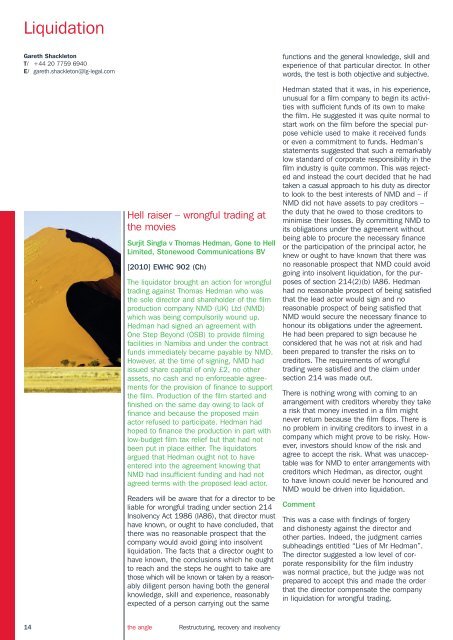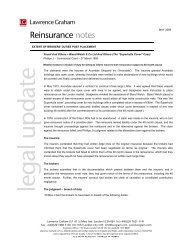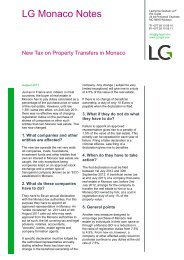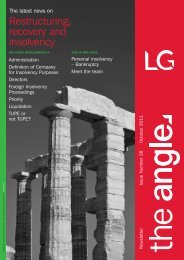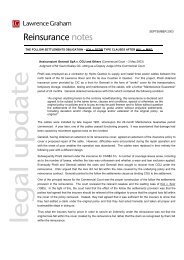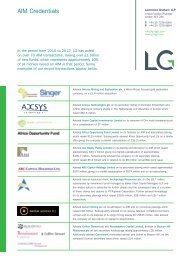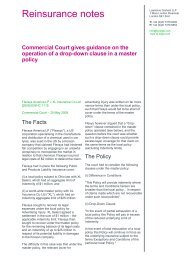download pdf - Lawrence Graham
download pdf - Lawrence Graham
download pdf - Lawrence Graham
- No tags were found...
You also want an ePaper? Increase the reach of your titles
YUMPU automatically turns print PDFs into web optimized ePapers that Google loves.
LiquidationGareth ShackletonT/ +44 20 7759 6940E/ gareth.shackleton@lg-legal.comfunctions and the general knowledge, skill andexperience of that particular director. In otherwords, the test is both objective and subjective.Hell raiser – wrongful trading atthe moviesSurjit Singla v Thomas Hedman, Gone to HellLimited, Stonewood Communications BV[2010] EWHC 902 (Ch)The liquidator brought an action for wrongfultrading against Thomas Hedman who wasthe sole director and shareholder of the filmproduction company NMD (UK) Ltd (NMD)which was being compulsorily wound up.Hedman had signed an agreement withOne Step Beyond (OSB) to provide filmingfacilities in Namibia and under the contractfunds immediately became payable by NMD.However, at the time of signing, NMD hadissued share capital of only £2, no otherassets, no cash and no enforceable agree -ments for the provision of finance to supportthe film. Production of the film started andfinished on the same day owing to lack offinance and because the proposed mainactor refused to participate. Hedman hadhoped to finance the production in part withlow-budget film tax relief but that had notbeen put in place either. The liquidatorsargued that Hedman ought not to haveentered into the agreement knowing thatNMD had insufficient funding and had notagreed terms with the proposed lead actor.Readers will be aware that for a director to beliable for wrongful trading under section 214Insolvency Act 1986 (IA86), that director musthave known, or ought to have concluded, thatthere was no reasonable prospect that thecom pany would avoid going into insolventliquidation. The facts that a director ought tohave known, the conclusions which he oughtto reach and the steps he ought to take arethose which will be known or taken by a reason -ably diligent person having both the generalknowledge, skill and experience, reasonablyexpected of a person carrying out the sameHedman stated that it was, in his experience,unusual for a film company to begin its acti vi -ties with sufficient funds of its own to makethe film. He suggested it was quite normal tostart work on the film before the special pur -pose vehicle used to make it received fundsor even a commitment to funds. Hedman’sstatements suggested that such a remarkablylow standard of corporate responsibility in thefilm industry is quite common. This was rejec t -ed and instead the court decided that he hadtaken a casual approach to his duty as directorto look to the best interests of NMD and – ifNMD did not have assets to pay creditors –the duty that he owed to those creditors tominimise their losses. By committing NMD toits obligations under the agreement withoutbeing able to procure the necessary financeor the participation of the principal actor, heknew or ought to have known that there wasno reasonable prospect that NMD could avoidgoing into insolvent liquidation, for the pur -poses of section 214(2)(b) IA86. Hedmanhad no reasonable prospect of being satisfiedthat the lead actor would sign and noreasonable prospect of being satisfied thatNMD would secure the necessary finance tohonour its obligations under the agreement.He had been prepared to sign because heconsidered that he was not at risk and hadbeen prepared to transfer the risks on tocreditors. The require ments of wrongfultrading were satisfied and the claim undersection 214 was made out.There is nothing wrong with coming to anarrangement with creditors whereby they takea risk that money invested in a film mightnever return because the film flops. There isno problem in inviting creditors to invest in acompany which might prove to be risky. How -ever, investors should know of the risk andagree to accept the risk. What was unaccep -table was for NMD to enter arrangements withcreditors which Hedman, as director, oughtto have known could never be honoured andNMD would be driven into liquidation.CommentThis was a case with findings of forgeryand dis honesty against the director andother parties. Indeed, the judgment carriessubheadings entitled “Lies of Mr Hedman”.The director suggested a low level of cor -porate responsibility for the film industrywas normal practice, but the judge was notprepared to accept this and made the orderthat the director compensate the companyin liquidation for wrongful trading.14 the angle Restructuring, recovery and insolvency


